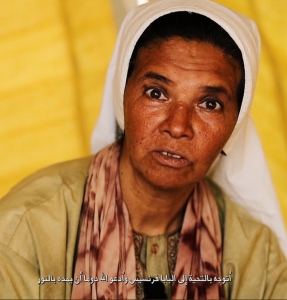7th February 2020 marks exactly 3 years since Sister Gloria Cecilia Narvaez Argoti was kidnapped by jihadists in the Franciscan mission where she lived and worked in Karangasso, Mali, close to the border with Burkina Faso.
Since September 2018, when a video was released with her sister and another hostage, the French doctor Sophie Petronin, there is no news about this 57-year-old Colombian nun.
Apparently recorded inside a tent, in this video Sister Gloria, who belongs to the Congregation of the Franciscans of Mary Immaculate, appears to request the Holy Father’s help for her release, thanking him for “taking care” of her case and asking also to not forget the situation of “Mrs. Sophie Petronin, because she is very sick”.
Most of the video, which is about seven minutes long, is occupied precisely by Sophie Petronin, then 75 years old, begging the intervention of French President Emmanuel Macron.
The video, the last proof of life for the Franciscan sister, ends with the nun saying that she prepares her things, as she “waits every day” for her release.
Since that video was released, it has been about twenty months. Twenty months of silence. Two other videos had previously been released, in July 2017 and January 2018. Both were also understood as “proof of life” that the terrorists would be producing abroad, fueling the expectation that the authorities would have established contact lines for possible negotiations with a view to the release of the sister and the other hostages.
The first video – released by the self-proclaimed “Support Group for Islam and Muslims”, a terrorist organization linked to Al Qaeda – is an example of this as five other foreign hostages, including Beatrice Stockly, a missionary, are filmed.
The attack of the jihadists of 7 February 2017 on the home of the Franciscan Sisters in Karangasso revealed all the courage of Sister Gloria.
Speaking to Spanish radio Cope, Sister Janet explained that the terrorists intended to kidnap another, younger sister, but it was Sister Gloria who asked to go in her place. “The men entered the room, aimed a gun at the younger sister and called the others. When Sister Gloria realized that this was not just a robbery, she left, ”explained Janet to journalists. “The men started asking questions and forced them to bring their passport … Gloria realized that it was a kidnapping and started talking to them, telling them not to take their younger sister, that if they needed anything it would be with her.” This selfless gesture revealed the personality of Sister Gloria. “We see her as a hero because she gave herself up for her younger sister,” added Janet to the Spanish radio microphones. Sister Gloria’s family also sees her as a true hero. The last time they spoke to her was in December 2016, two months before the kidnapping. At the time, Gloria Cecilia confessed that she was planning to return to her country, to Colombia, and that she would request the transfer from her community.
For local populations, the kidnapping proved to be strange and even inexplicable. How can you want to do harm to a handful of women who are consecrated to God and to their neighbors and who were only there to help in much needed areas, such as support in health, food and literacy?
In fact, for more than a decade, the Franciscan Sisters of Mary Immaculate have been carrying out their mission in Mali, seeking to help the most deprived populations. The kidnapping of the Colombian sister is just one example of the extreme violence that has been affecting Christian communities not only in Mali but also in the countries of the region, with emphasis on Niger and Burkina Faso.





